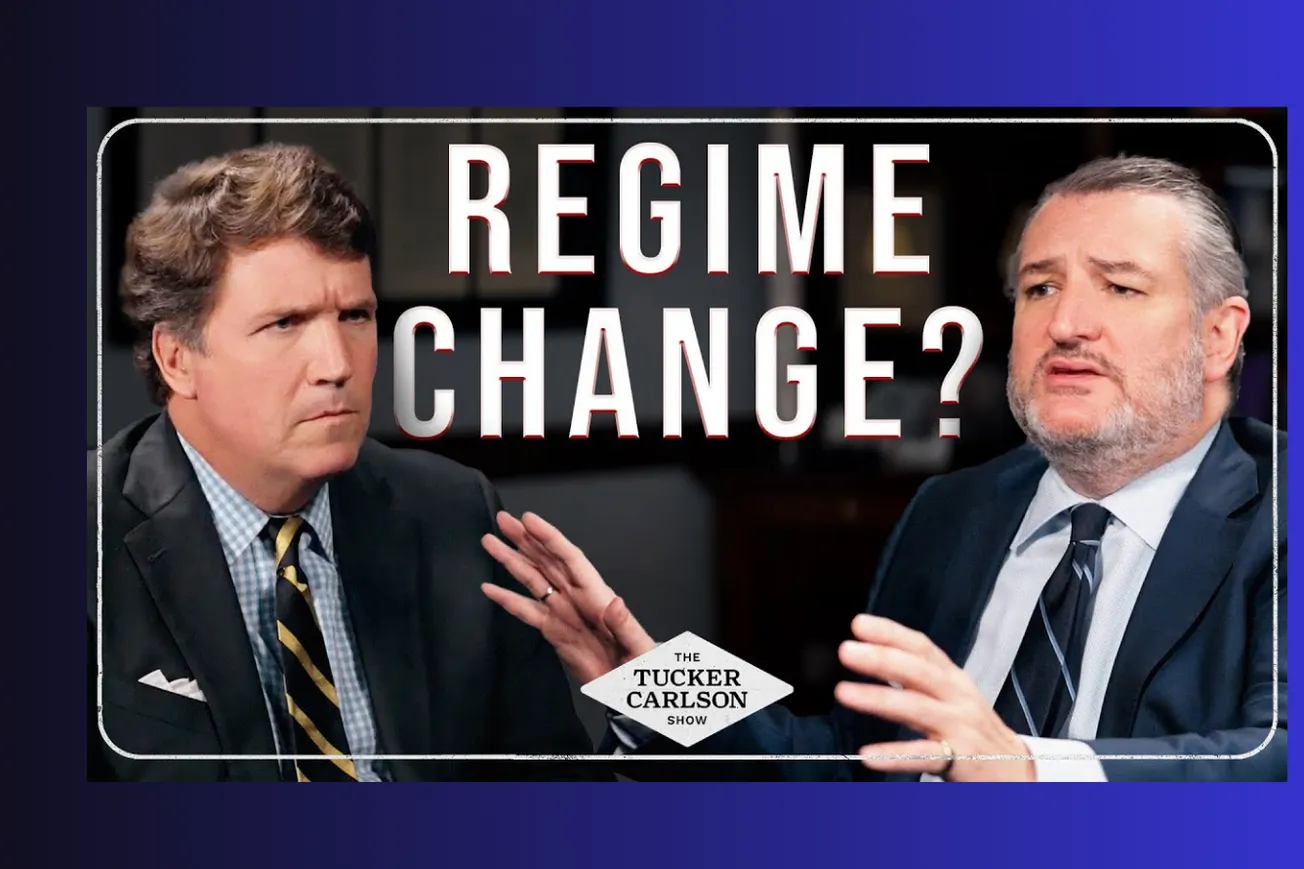Table of Contents
Tucker Carlson and Ted Cruz engage in a contentious discussion about Iran policy, AIPAC influence, and America's role in Middle Eastern conflicts, revealing deep philosophical divisions within conservative foreign policy thinking.
Key Takeaways
- Cruz supports Iranian regime change through "popular uprising" while denying he advocates direct U.S. military intervention, despite acknowledging current Israeli operations against Iran
- The senator admits receiving significant AIPAC fundraising support but denies the organization coordinates with Israeli government, claiming it only represents American interests
- Cruz justifies his Israel support through biblical theology, citing Genesis passages about blessing Israel, though he cannot identify the specific biblical reference
- The interview reveals Cruz's limited knowledge of Iran's demographics and ethnic composition despite advocating for regime change affecting 92 million people
- Cruz claims Iran is actively trying to assassinate Donald Trump through hired hitmen in the United States, though provides no specific evidence or arrests
- The senator acknowledges voting for initial Ukraine funding but later opposed subsequent aid packages after recognizing the policy wasn't working
- Cruz authored sanctions legislation that successfully stopped Russia's Nordstream 2 pipeline, which he credits with preventing earlier war but blames Biden for reversing
- The heated exchange includes accusations of anti-Semitism, isolationism, and moral relativism as both participants defend their foreign policy philosophies
Regime Change Philosophy: Popular Uprising vs. Military Intervention
Ted Cruz advocates for Iranian regime change while carefully distinguishing between desired outcomes and military means. He argues that America would obviously benefit from having Iranian leadership that "likes us and wants to be friends" rather than one that "hates us and wants to kill us," framing this as basic common sense rather than controversial policy.
The senator emphasizes that regime change must come through "popular uprising from the people" rather than U.S. military intervention. He draws comparisons to Ronald Reagan's approach toward the Soviet Union, highlighting the use of economic pressure, moral persuasion, and the "bully pulpit" rather than direct military action.
Cruz cites his work with Iranian dissident groups and public criticism of human rights abuses as examples of appropriate American involvement. He argues that "shining truth and light" can be as effective as military force, referencing Reagan's Berlin Wall speech that was initially opposed by the State Department as too provocative.
However, the distinction becomes blurred when discussing current Israeli operations against Iran that Cruz supports. While denying U.S. direct military participation, he acknowledges American support for Israeli strikes against Iranian nuclear facilities and military leadership, creating ambiguity about the line between support and direct involvement.
Carlson challenges this framework by questioning whether Cruz's approach amounts to outsourcing American foreign policy to Israel, particularly given his claims about Iranian assassination attempts against Trump that he believes justify regime change but not direct U.S. military retaliation.
Biblical Theology and Israeli Support
Cruz reveals deeply personal religious motivations for his unwavering Israel support, citing biblical commands that he believes require Christian support for the modern Israeli state. He references Genesis passages about blessing Israel, though admits he cannot provide the specific biblical citation during the interview.
The theological discussion becomes contentious when Carlson questions whether ancient biblical references to Israel apply to the modern political entity established in 1948. Cruz insists that Genesis refers to "the nation of Israel" as a political entity that has existed "for thousands of years," conflating historical Israel with the contemporary Israeli state.
Cruz acknowledges this personal faith motivation while arguing that his public policy positions are based on American national security interests rather than religious conviction. He claims the biblical imperative is personal motivation but that supporting Israel benefits America through intelligence sharing and regional stability.
The senator's theological interpretation faces scrutiny when Carlson notes that the Genesis passages likely refer to the Jewish people rather than a specific government. Cruz maintains that God was discussing a political nation, leading to questions about whether biblical commands extend to supporting particular Israeli policies or leaders.
This religious framework provides insight into the depth of Cruz's commitment to Israel support, suggesting motivations that transcend typical political calculations and create resistance to policy adjustments based on changing circumstances or strategic considerations.
AIPAC Influence and Foreign Lobbying Controversy
The interview's most heated exchanges focus on AIPAC's role in American politics and Cruz's relationship with the organization. Cruz acknowledges receiving significant fundraising support from AIPAC-organized events while denying that this constitutes foreign lobbying or coordination with the Israeli government.
Cruz describes AIPAC fundraising mechanics: local business owners host events where supporters write individual checks, typically raising $50,000 from 50 attendees contributing $1,000 each. He insists these are American citizens supporting U.S.-Israel friendship rather than foreign government influence operations.
The discussion becomes confrontational when Carlson questions why AIPAC doesn't register under the Foreign Agent Registration Act (FARA) like other organizations representing foreign government interests. Cruz denies that AIPAC coordinates with Israeli officials, though admits they likely have contact similar to other international lobbying efforts.
Carlson points out the inconsistency of Americans being prosecuted for unregistered foreign lobbying while AIPAC maintains exemption despite performing similar functions. Cruz deflects by arguing that AIPAC represents American interests in supporting the U.S.-Israel relationship rather than Israeli government positions.
The senator becomes defensive when questioned about Israeli espionage against the United States, including surveillance of American presidents. Cruz accepts this as normal behavior among allies while arguing that America benefits overall from the intelligence relationship despite violations of sovereignty.
Iran Assassination Allegations and Evidence Questions
Cruz makes explosive claims about ongoing Iranian assassination attempts against Donald Trump and former administration officials, stating that Iran has hired hitmen currently operating in the United States. However, he provides little specific evidence to support these serious allegations.
The senator cites congressional testimony from military and intelligence officials over the past two years claiming Iranian plots against Trump, Mike Pompeo, John Bolton, and Brian Hook. He notes that the Biden administration spent $2 million monthly providing security for these former officials due to perceived threats.
Cruz mentions arrests of Iranian operatives near John Bolton's apartment complex, though details remain vague about timing, specific charges, or current status of these cases. When pressed for names, locations, or evidence of active plots against Trump, Cruz admits he doesn't know specific details.
The discussion reveals logical inconsistencies in Cruz's position: if Iran is actively trying to assassinate the American president, why doesn't he support immediate military retaliation? Cruz argues that Iranian incompetence reduces the threat level, making it manageable without direct U.S. military response.
Carlson challenges Netanyahu's claim that Iran carried out two assassination attempts against Trump, noting lack of evidence connecting known attempts to Iranian operatives. Cruz acknowledges this as Netanyahu misspeaking while maintaining that Iranian assassination efforts are ongoing and documented.
Knowledge Gaps on Iran and Regional Dynamics
Despite advocating for regime change in Iran, Cruz demonstrates limited factual knowledge about the country he seeks to transform. When asked about Iran's population, he admits not knowing the number (92 million), and shows unfamiliarity with the country's ethnic composition beyond identifying Persians and Shia Muslims.
This knowledge gap extends to understanding potential consequences of regime change. Iran contains significant ethnic minorities including Kurds, Arabs, and Baluchis who might seek independence following central government collapse, potentially creating civil war scenarios similar to post-intervention Iraq and Libya.
Cruz's analysis lacks consideration of regional implications, including how Iranian regime change might affect relationships between Gulf Arab states and Israel. Currently, Iranian threats drive cooperation between these traditional adversaries, but eliminating this shared threat could reverse diplomatic progress.
The senator cannot articulate clear post-regime change scenarios, defaulting to hopes for "popular democracy" without addressing how to prevent the religious extremism and civil conflict that followed similar interventions in Iraq, Libya, and Syria.
When questioned about potential refugee flows and regional destabilization, Cruz acknowledges these risks but argues they are outweighed by preventing Iranian nuclear weapons development. However, he provides no detailed analysis of how to manage these consequences or ensure better outcomes than previous regime change operations.
Ukraine Policy Evolution and Lessons Learned
Cruz's Ukraine policy demonstrates evolution from initial hawkish support to growing skepticism about effectiveness and costs. He initially voted for funding packages but later opposed subsequent aid after concluding the policy wasn't achieving stated objectives.
The senator takes credit for Nordstream 2 sanctions that he argues prevented earlier Russian invasion by denying Putin economic benefits from circumventing Ukraine. He contends that Biden's decision to waive these sanctions directly caused the 2022 invasion by signaling American weakness.
Cruz's narrative places responsibility for the conflict on Biden administration policies rather than acknowledging potential roles of NATO expansion discussions or the 2014 Ukrainian political changes. He maintains that strong sanctions and energy independence would have deterred Russian aggression without military confrontation.
The senator expresses frustration with Zelensky's recent White House performance, describing it as the worst Oval Office meeting in history due to the Ukrainian president's confrontational approach and unrealistic expectations about continued American support.
Despite earlier characterizations of Ukrainian resistance as heroic, Cruz now emphasizes American interests over moral solidarity with Ukraine. This shift reflects broader conservative movement away from international commitments toward more transactional foreign policy approaches.
Philosophical Divide: Interventionism vs. America First
The interview exposes fundamental philosophical differences about American global role and foreign policy priorities. Cruz positions himself as a "non-interventionist hawk" who supports strong military capabilities while avoiding unnecessary overseas commitments.
Carlson advocates for more restrictive engagement focused primarily on direct American interests, questioning the costs and effectiveness of current Middle Eastern commitments. He argues that domestic problems like urban decay and economic challenges deserve priority over foreign conflicts.
The exchange reveals tensions within conservative foreign policy thinking between traditional Republican internationalism and Trump-era America First approaches. Cruz attempts to reconcile these positions by emphasizing threats to American security rather than democracy promotion or humanitarian concerns.
Both participants agree on opposing large-scale military occupations and nation-building efforts, drawing lessons from Iraq and Afghanistan experiences. However, they disagree about appropriate levels of support for allies and responses to foreign threats that don't directly target American territory.
The debate illustrates broader Republican party divisions between traditional foreign policy establishments and populist movements that question overseas commitments and alliance obligations that previous generations accepted as necessary for American security and prosperity.
Regional Consequences and Strategic Blindness
The discussion reveals limited consideration of how Iranian regime change might affect broader Middle Eastern dynamics and American strategic interests. Cruz focuses primarily on nuclear threats while ignoring potential consequences for regional stability and energy markets.
Iranian collapse could create massive refugee flows toward Europe, potentially destabilizing NATO allies already struggling with migration pressures. The senator provides no analysis of how to manage these humanitarian consequences or their political implications for American alliance relationships.
Energy market disruptions from Iranian civil conflict could spike global oil prices regardless of regime change success, potentially triggering American economic recession and undermining domestic political support for the intervention. Cruz dismisses these economic considerations despite their historical importance.
The interview lacks discussion of how regime change might affect American military positioning in Iraq and Syria, where Iranian proxy forces currently provide both threats and justifications for continued U.S. presence. Removing Iranian influence could eliminate reasons for maintaining these deployments while creating new security challenges.
China and Russia would likely benefit from American involvement in another Middle Eastern regime change operation, diverting resources and attention from Pacific competition that both participants acknowledge as more important for long-term American interests and economic prosperity.
Common Questions
Q: What is Cruz's position on Iranian regime change?
A: Cruz supports regime change through "popular uprising" rather than direct U.S. military intervention, using economic pressure and moral persuasion similar to Reagan's approach toward the Soviet Union.
Q: Why does Cruz support Israel so strongly?
A: Cruz cites biblical commands from Genesis about blessing Israel, combined with strategic arguments about intelligence sharing and regional security benefits for America.
Q: Does AIPAC coordinate with the Israeli government?
A: Cruz denies coordinatio





